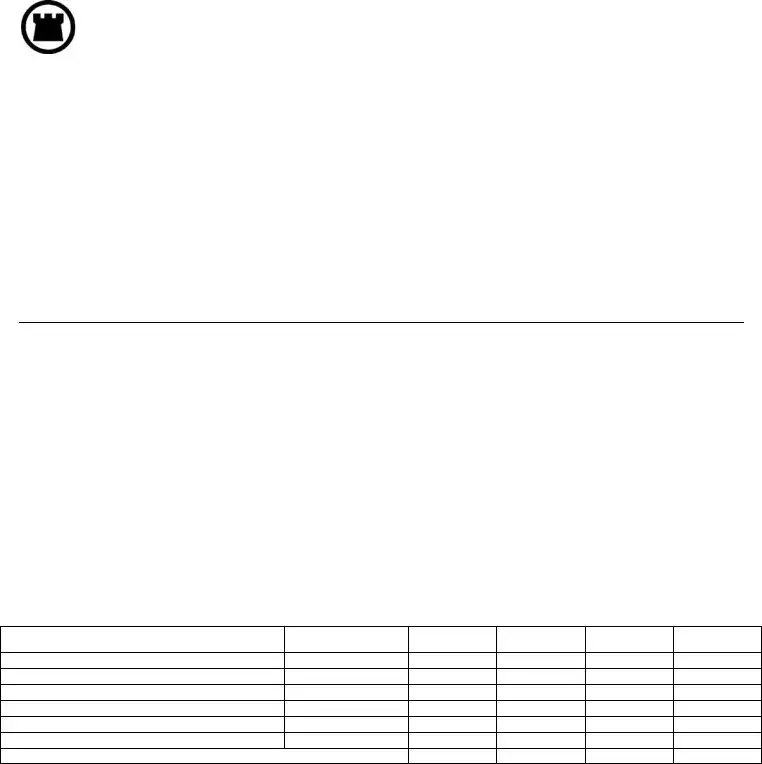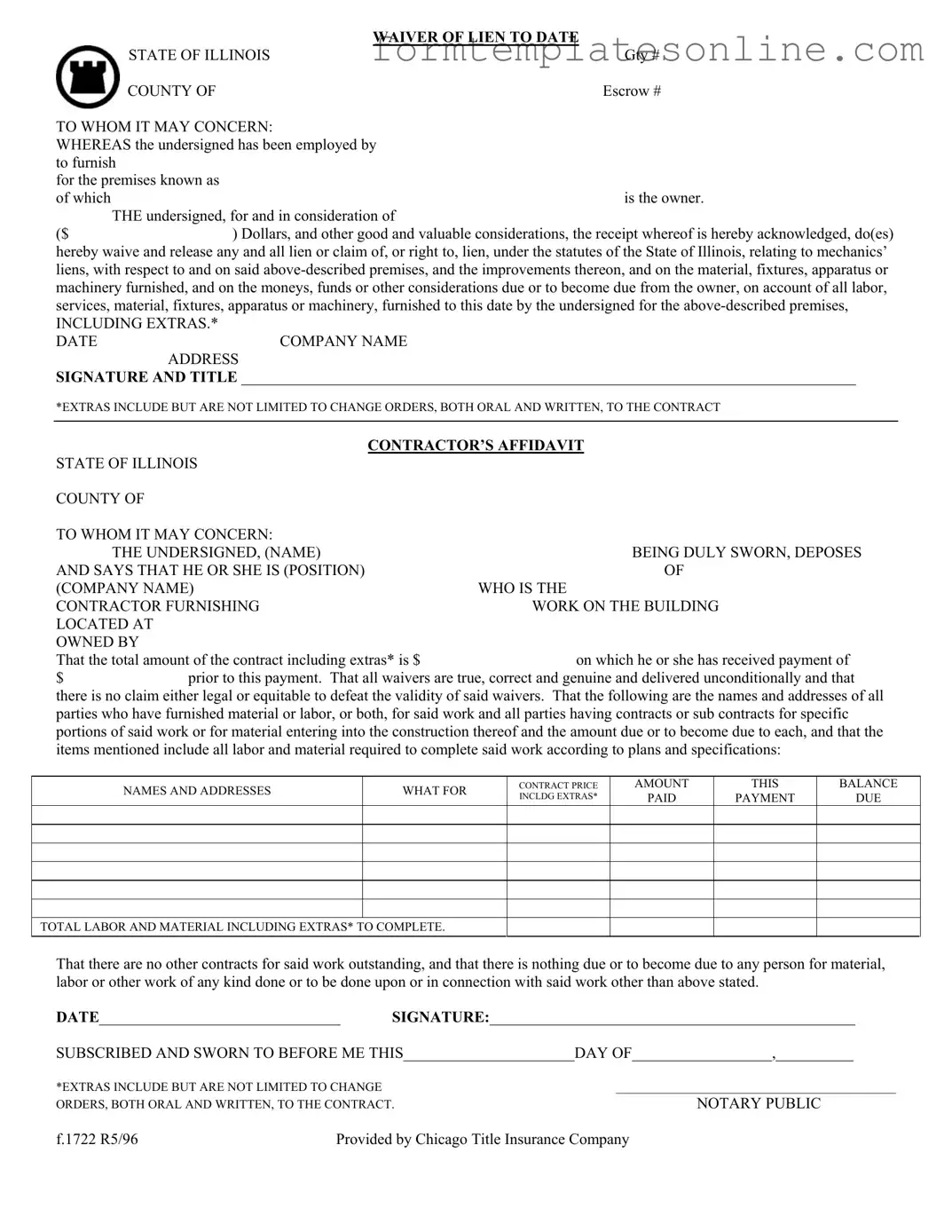Chicago Title Waiver Format PDF Form
The Chicago Title Waiver Format form plays a crucial role in the construction and real estate industries in Illinois. It serves as a formal document that allows contractors and subcontractors to waive their right to file a mechanics' lien against a property for work performed or materials supplied. This waiver is significant because it protects property owners from potential claims that could arise after payment has been made for services rendered. The form includes essential details such as the company name, the property address, and the amount paid, ensuring transparency in financial transactions. It also outlines the contractor's affirmation that all waivers are genuine and that no further claims exist regarding the work completed. Notably, the form addresses "extras," which refers to any additional work or change orders that may not have been included in the original contract. By providing a comprehensive overview of all parties involved and their respective financial obligations, the Chicago Title Waiver Format helps streamline the payment process and mitigates the risk of disputes. With a clear structure and necessary declarations, this form is an indispensable tool for anyone engaged in construction or property development in Illinois.
Common mistakes
-
Incomplete Information: One of the most common mistakes is failing to fill out all required fields. Every section of the form must be completed, including the company name, contract amount, and signatures. Leaving any part blank can lead to delays or rejections.
-
Incorrect Dates: Entering the wrong date can create confusion. Ensure that the date of the waiver and the date of the notarization are accurate and consistent. An incorrect date may invalidate the document.
-
Omitting Signatures: The form must be signed by the appropriate parties. Failing to include the signature of the contractor or the notary can render the waiver ineffective. Always double-check that all necessary signatures are present.
-
Misunderstanding "Extras": Many people overlook the definition of "extras." This term includes any change orders, whether oral or written. Failing to account for these can lead to disputes later. Be sure to list all extras clearly to avoid misunderstandings.
-
Neglecting to List All Parties: It’s crucial to include the names and addresses of all parties involved in the project. Omitting any contractors or subcontractors can create legal complications. Ensure that every entity that contributed labor or materials is documented.
Example - Chicago Title Waiver Format Form

WAIVER OF LIEN TO DATE |
|
S STATE OF ILLINOIS |
Gty # |
COUNTY OF |
Escrow # |
TO WHOM IT MAY CONCERN: |
|
WHEREAS the undersigned has been employed by |
|
to furnish |
|
for the premises known as |
|
of which |
is the owner. |
THE undersigned, for and in consideration of
($) Dollars, and other good and valuable considerations, the receipt whereof is hereby acknowledged, do(es) hereby waive and release any and all lien or claim of, or right to, lien, under the statutes of the State of Illinois, relating to mechanics’ liens, with respect to and on said
INCLUDING EXTRAS.* DATE
ADDRESS
SIGNATURE AND TITLE _______________________________________________________________________________
*EXTRAS INCLUDE BUT ARE NOT LIMITED TO CHANGE ORDERS, BOTH ORAL AND WRITTEN, TO THE CONTRACT
CONTRACTOR’S AFFIDAVIT
STATE OF ILLINOIS
COUNTY OF |
|
TO WHOM IT MAY CONCERN: |
|
THE UNDERSIGNED, (NAME) |
BEING DULY SWORN, DEPOSES |
AND SAYS THAT HE OR SHE IS (POSITION) |
OF |
(COMPANY NAME) |
WHO IS THE |
CONTRACTOR FURNISHING |
WORK ON THE BUILDING |
LOCATED AT |
|
OWNED BY |
|
That the total amount of the contract including extras* is $ |
on which he or she has received payment of |
$prior to this payment. That all waivers are true, correct and genuine and delivered unconditionally and that there is no claim either legal or equitable to defeat the validity of said waivers. That the following are the names and addresses of all parties who have furnished material or labor, or both, for said work and all parties having contracts or sub contracts for specific portions of said work or for material entering into the construction thereof and the amount due or to become due to each, and that the items mentioned include all labor and material required to complete said work according to plans and specifications:
NAMES AND ADDRESSES
WHAT FOR
CONTRACT PRICE INCLDG EXTRAS*
AMOUNT
PAID
THIS
PAYMENT
BALANCE
DUE
TOTAL LABOR AND MATERIAL INCLUDING EXTRAS* TO COMPLETE.
That there are no other contracts for said work outstanding, and that there is nothing due or to become due to any person for material, labor or other work of any kind done or to be done upon or in connection with said work other than above stated.
DATE_______________________________ |
SIGNATURE:_______________________________________________ |
||
SUBSCRIBED AND SWORN TO BEFORE ME THIS______________________DAY OF__________________,__________ |
|||
*EXTRAS INCLUDE BUT ARE NOT LIMITED TO CHANGE |
|
_____________________________________________ |
|
ORDERS, BOTH ORAL AND WRITTEN, TO THE CONTRACT. |
NOTARY PUBLIC |
||
f.1722 R5/96 |
Provided by Chicago Title Insurance Company |
||
More About Chicago Title Waiver Format
What is the Chicago Title Waiver Format form?
The Chicago Title Waiver Format form is a legal document used in Illinois to waive any mechanics' lien rights that a contractor or supplier may have against a property. This waiver is typically executed after payment is received for work or materials provided. It helps protect property owners from potential claims by ensuring that all parties involved in the project acknowledge receipt of payment and relinquish their rights to file a lien.
Who needs to use this form?
This form is primarily used by contractors, subcontractors, and suppliers who have provided labor or materials for a construction project. It is essential for anyone who wants to formally release their lien rights in exchange for payment. Property owners may also request this waiver to ensure that they are protected from future claims after making payments.
What information is required to complete the form?
To complete the Chicago Title Waiver Format form, you will need to provide several key pieces of information. This includes the company name, the property address, the total contract amount, the amount paid to date, and details about any additional work or materials (referred to as "extras"). The form must also include the signatures of the parties involved and be notarized to ensure its validity.
What are "extras" in the context of this form?
"Extras" refer to any additional work or materials that were not originally included in the contract but were necessary for completing the project. This can include change orders, which may be either verbal or written. It is important to document these extras in the waiver to ensure that all parties are aware of the full scope of work and any additional costs involved.
Is notarization required for the form?
Yes, notarization is required for the Chicago Title Waiver Format form. This step adds a layer of authenticity and ensures that the signatures are valid. The notary public will witness the signing of the document and provide their seal, which is essential for the waiver to be legally binding.
What happens if the waiver is not executed?
If the waiver is not executed, the contractor or supplier retains their right to file a mechanics' lien against the property. This means that if payment is not received, they can legally claim an interest in the property until they are compensated. This could lead to potential legal disputes and complications for property owners, making it crucial to complete the waiver when payments are made.
Key takeaways
When using the Chicago Title Waiver Format form, keep these key takeaways in mind:
- Understand the Purpose: This form serves to waive any lien rights you may have on the property after receiving payment. It protects the property owner from potential claims.
- Complete All Sections: Fill out each part of the form accurately, including the company name, project details, and payment amounts. Incomplete forms may lead to issues down the line.
- Include Extras: Remember that "extras" can include change orders. Clearly list these to ensure all work is accounted for in the waiver.
- Notarization is Essential: The form must be notarized to be valid. Ensure you have a notary present when signing to avoid complications.
Form Attributes
| Fact Name | Details |
|---|---|
| Purpose | The Chicago Title Waiver Format form is used to waive and release any lien claims related to mechanics’ liens for work performed on a property in Illinois. |
| Governing Law | This form is governed by the statutes of the State of Illinois, specifically those relating to mechanics’ liens. |
| Consideration | The form requires acknowledgment of receipt of a specified amount of money or other valuable considerations in exchange for the waiver. |
| Extras Definition | Extras refer to additional work or changes, both oral and written, that may affect the contract price and must be included in the waiver. |
Other PDF Forms
Da - The DA Form 2062 includes a reverse side for additional notes or extended entries.
Gift Letter for Mortgage Template - A Gift Letter can provide reassurance to lenders about financial backing.
Understanding the importance of having a New York Durable Power of Attorney is essential for safeguarding your financial interests. This legal document, which allows an individual to delegate authority to an agent, can be particularly valuable in cases where the principal is unable to manage their financial decisions. For more details on how to create this critical document, you can visit OnlineLawDocs.com.
Size of 96 Well Plate - A versatile tool for conducting multiple assays.
Dos and Don'ts
When filling out the Chicago Title Waiver Format form, it’s essential to follow certain guidelines to ensure accuracy and compliance. Here’s a helpful list of things you should and shouldn’t do:
- Do ensure that all information is complete and accurate before submitting the form.
- Do double-check the names and addresses of all parties involved to avoid any discrepancies.
- Do clearly state the amount being waived to prevent misunderstandings.
- Do sign and date the form in the designated areas to validate it.
- Don't leave any sections blank, as this may lead to delays or rejections.
- Don't forget to include any extras, such as change orders, as they are crucial for the waiver's validity.
